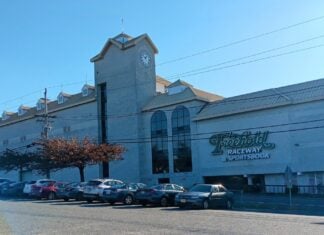
The Haddonfield Planning Board held a special meeting on Thursday, March 3 to discuss the redevelopment plan of the Bancroft property. Phil Caton of Clark, Caton & Hintz, whom the borough hired to create the redevelopment plan, gave a presentation to the board on the plan for approval, as it is the first step the borough has to take to purchase the property.
An agreement between the borough and 2 Hopkins Lane, LLC, Brian O’Neill of Recovery Centers of America’s buying company, has the sale price of the 19.2 acres set at $12.9 million, split between Bancroft at $11.5 million and O’Neill’s company at $1.4 million.
The agreement also provides an option for 2 Hopkins Lane, LLC to buy back 8.2 acres for $5.5 million to develop age-targeted townhomes, pursuant to an adopted redevelopment plan. The developer also has an opt-out to not buy the acres, with the borough paying an additional $600,000, covering O’Neill’s costs from the rehab center proposal.
The closing date for the purchase of the Bancroft property is June 30. The borough has a pretty strict deadline of how things need to be done to purchase by June 30. This includes having the redevelopment plan set and approved by the Planning Board by March 17.
“We have a deadline to purchase the property. We must have all ducks in a line so we can close for June 30. That means in order for us to be able to adopt our bond… we need to have this finalized,” Borough Administrator Sharon McCullough said.
The plan is intended to foster the development of well-designed age-targeted and affordable housing, expand open space, provide for expanded active recreation facilities adjacent to the high school and preserve the historic Lullworth Hall complex. Within this overall redevelopment goal, the plan establishes a set of objectives based on public input conveyed over the many years during which Bancroft property redevelopment has been considered.
The plan objectives include, but are not limited to, the following:
• To encourage high quality architectural design and construction of new residential buildings within the redevelopment area, which reflect the character and scale of the building stock of the borough
• To integrate the affordable housing seamlessly with the market-rate age-targeted dwellings
• To devote a significant portion of the east side of Hopkins Lane to passive open space, including a comprehensive pedestrian and cycling path system connecting to existing and planned pathways to Hopkins Pond, Cooper River Park and along Kings Highway
• To provide for an active recreational facility, such as a baseball or multi-purpose field on the west side of Hopkins Lane
• To facilitate the preservation and adaptive use of historical Lullworth Hall, its carriage house and any other historic resources on the property that can be reasonably preserved for beneficial use
• To guide the site planning of the residential development to the east side of Hopkins Lane to be sensitive to the importance of the landscape/bermed frontage of the redevelopment area on Kings Highway as a principal gateway to the borough and to enhance the natural wooded buffer along the Cooper River
• To provide adequate parking, both on and off street, for the residential development, Lullworth Hall and various public uses contemplated in the redevelopment plan
According to Caton, the plan is a “living document,” meaning it can be changed. The plans are also not binding.
“There is no reason to not adopt this as a redevelopment plan in order for it to fit the schedule, as you can always go back to it and investigate it further, and if need be, change it,” Caton said.
Caton also gave the planning board some examples of possible site and housing plans created by O’Neill’s company and Caton. The plans included different orientations of the proposed housing developments, 70 age-targeted units and 10 affordable housing units, as well as the types of developments, including townhomes and a multi-story housing building.
The board agreed some of the objectives were a little vague and may need some better definitions and limits, such as what is age-targeted housing and limits on the size of the housing units. It also felt language regarding keeping things tax neutral was needed in the objectives.
Feeling it needed more time to make these possible additions, board members decided they will forward their ideas and suggestions to McCullough, have those sent to the Planning Board’s subcommittee for discussion with Caton and come back for a special meeting on March 17 for approval. That meeting will be held at 7:30 p.m. at Borough Hall, and will also include a formal public hearing.









